-

新人教版高中英语必修3Unit 4 Space Exploration-Reading and Thinking教学设计二
The theme of this unit focuses on “space exploration.” Students will learn about the training and experience needed to become an astronaut. The text is mainly about the development of space exploration. On the one hand, the text helps students to have a good understanding about the great feats humans have achieved, on the other hand, they will further understand the contributions that we Chinese have achieved, and feel confident and proud about our homeland and strengthen their love for our country. The teacher should instruct students to aim high and study harder to make great progress in the space career if possible.1. Read about the development and value of space exploration.2. Explore the mysteries of the universe and the achievements in space exploration.3. Skillfully use the vocabulary of this text to cultivate self-study ability 4. Develop cooperative learning ability through discussion.1. Enable the Ss to talk about the development and value of space exploration.2. Guide the Ss to summarize the main idea of each paragraph as well as the main idea of the text.3. Help Ss comprehend the main reasons for space exploration. Multi-media, textbook, notebooks.Step 1: Warming up and predictionLook at the title and the pictures of the text and predict what the text will be about?2. What are the main reasons for space exploration?

新人教版高中英语必修3Unit 4 Space Exploration-Reading for Writing教学设计二
⑦在我看来, 探索太空是值得的。As far as I am concerned, it is worthwhile to explore the space.Step 10 Writing---draftRecently, students in our class have had heated a discussion on whether space is worth exploring. Students hold different ideas about it.30% of us think space exploration is not worthwhile. They think space is too far away from us and our daily life and is a waste of money. And the money spent on space exploration can be used to solve the earth’s problems such as starvation and pollution.On the other hand,70% think space is worth exploring because we have benefited a lot from it,such as using satellites for communication and weather forecast. What’s more,with further space research,we may solve the population problem by moving to other planets one day. Also,space research will enable us to find new sources to solve the problem of energy shortages on the earth.As far as I am concerned, it is worthwhile to explore the space. Not only can it promote the development of society but also enrich our life. Step 11 Pair workExchange drafts with a partner. Use this checklist to help your partner revise his/her draft.1.Does the writer explain why he/she changed/wanted to change?2.Does the writer tell how the changes have improved or will improve his/her life?3.Is the text well-organised?4.Does the writer use words and expressions to show similarities and differences?5.Are there any grammar or spelling errors?6.Does the writer use correct punctuation?

新人教版高中英语必修3Unit 5 The Value of Money- Discovering Useful Structure教学设计
Step 3 Meaning1. 过去将来时表示从过去某一时间来看将要发生的动作或存在的状态, 常用在宾语从句中。一般由“would/should +动词原形”构成。She hoped that they would meet again someday. 她希望将来有一天他们能再见面。2. was/were going to+动词原形: 表示过去将要发生或很有可能发生的动作, 常用于口语中, 表示预言、意图或者打算等。He was going to start work the following week. 他打算下星期开始工作。3. was/were about to do: 常用来表示即将发生的动作, “刚要/正要做……”。注意该结构不与任何时间状语连用。I felt that something terrible was about to happen. 我感到某种可怕的事情即将发生。4.was/were to do: 表示“曾计划做某事”, 如果表示“本来计划做某事, 动作没实现”, 则需用 “was/were to have done”。She said she was to have told me about the accident. 她说她本来想告诉我关于事故的事。5.Start, go, come, leave, see, meet等动词的过去进行时: 表示就过去某一时刻而言即将发生的动作。She was coming later. 她随后就来。I had just put on my overcoat and was leaving to visit a friend of mine. 我刚穿上外套要去看我的一个朋友。

新人教版高中英语必修3Unit 5 The Value of Money-Listening &Speaking&Talking教学设计
4. A:We’d like to have someone to say a word at the beginning to welcome the group.B:↙Who?A:We thought that you or Dr.Johnson might do it.B用降调说Who,其意思是问,对方想让谁在开场时致欢迎词。Step 6 Pronunciation---Practice1. Listen to the short conversation and mark the intonation with ↗, ↙ or ↙, ↗. Then discuss with a partner what they intend to convey by using different intonation.Owner: You know what ?↗ It’s a million-pound bank note↙.Waiter 1: Really ?↗(question)Waiter 2: Really !↙(unbelievable and surprised)Waiter 3: Really ?!↙↗(first question then surprised)2. Listen to the conversations. Underline the parts that are stressed and mark the intonation. Then talk about the implied meanings of the responses with different intonations. Listen again and repeat.1) Henry: It’s a nice suit.Owner: Oh, it’s perfect!↙(The intonation means it is very suitable for Henry.)2) Henry: Well, that’s very kind of you.Owner: Kind, sir ?↗(what you said is not right) No, it’s kind of you. You must come whenever you want and have whatever you like. Just having you sit here is a great honour !!↙(welcome you to come again)3)Henry:Well, to be honest, I have none. Oliver:(happily) What luck!(excited) Brother↗, what luck!↙(It means “Didn’t you hear it?”)Henry: Well, it may seem lucky to you but not to me!↗(angry) If this is your idea of some kind of joke, I don’t think it’s very funny. Now if you’ll excuse me, I ought to be on my way.↙(If so, I would leave.)Roderick: Please don’t go↙...(hope Henry can wait for a moment)Part B Viewing and Talking---Describe people’s changing attitudes in a film clipStep 1 Before-listening---Tell the filmYou are going to watch part of the film The Million Pound Bank Note. Look at these photos and guess what happens in the film.

新人教版高中英语必修3Unit 5 The Value of Money-Listening &Speaking教学设计
Step 4: Listen again and decide if the following statements are true (T) or false (F).1 It was the first time Chen Liyan's story was reported. T口 F口2 Chen found 10,000 yuan in a small plastic bag in Taiyuan railway station口 F口3 Wang Zheng apologized to Chen because he couldn't offer her more money. T口 F口4 Chen took out a large loan to cure her daughter, T口 F口5 Wang set up a fundraising website for Chen's daughter after Chen told him about her situation. T口 F口Step 5:After listening, discuss the questions.1 What kind of person do you think Chen Liyan is?Chen Liyan is generous and honest because she returned a large sum of money to the owner.2 Did Chen return the money because she didn't need it?No. She returned the money because it was the right thing to do. Evidence for this is that she refused to accept the reward money because she felt that it had not been earned. 3 Is it common for people to do what Chen did?It depends on the culture. In some countries it is quite common to return money that has been found. In other countries, people believe "Finders are keepers!" 4 How did Wang Zheng feel about the return of his money?He must have been very happy and relieved to have gotten his money back. We know this because he thanked Chen repeatedly and even offered her a reward.5 Why did Ma Dongbao tell Wang about Chen's family?He must have had great sympathy for Chen and her daughter and wanted to help them.'We know this because he arranged help for them. 6 How did the news reporter feel about Chen's actions?The news reporter felt that it showed that money wasn't the most important thing in life. We know this because the reporter told us that this is what Chen believes. and then said, “that's a great attitude to take."

新人教版高中英语必修3Unit 5 The value of money-Reading and Thinking教学设计二
? Could you offer me some kind of work here?? I don’t want your charity, I just want an honest job.? Careless: I landed in Britain by accident.Step 7:Consolidation.? Find Henry? Roderick and Oliver were I .making a bet when they saw Henry, a poor young man. ? Know Henry? About a month ago, Henry was sailing and later he found himself carried out to sea by a strong wind. Fortunately, he 2.was spotted by a ship. And it was the ship that brought him to 3.England? Offer money to Henry ? Oliver and Roderick gave Henry a letter and told him that there was money in it. They 4.persuaded him to accept it, and made him 5.promise that it wouldn't be opened until 2 o'clock.Step 8:Language pointsa large amount of: a large quantity of; a great deal ofe.g. They bought a large amount of furniture before they moved their new house.make a bet: make an arrangement to risk money, etc. on an event of which the result is doubtful.e.g. We made a bet on the result of the match.permit sb to do something: allow somebody to do somethinge.g. My mother doesn’t permit me to ride in the street after it rained.by accident: as a result of chancee.g. I only found it by accident.stare at: look at somebody or something with the eyes wide open in a fixed gaze( in astonishment, wonder, fear, etc)to be honest: to tell you the truth; to be franke.g. To be honest, I don’t think we have a chance of winning.Step7 Homework:What do you think will happen to Henry? Will the bank-note help him or get him into trouble?

新人教版高中英语必修3Unit 5 The Value of Money-Reading for Writing教学设计二
2. 您能看到, 我头发太长了。You can see that my hair is much too long.3. 无论什么时候, 只要您想回来就回来。Please come back whenever you want.4. 您仅有很少的头发要理! You only have too little hair to cut !5. 为您服务是我的荣幸!It is my honour to serve you!Step 9 Writing(Henry is walking down the street when he sees a sign for a place that cuts hair. He decides to have it cut. )H=Henry B=BarberH: Good afternoon, I’d like to have my hair cut, if I may. (The barber looks at Henry’s hair and continues cutting another man’s hair. ) Er, I’d really like a haircut. As you can see it’s much too long. B: (in a rude manner) Yes, I can see that. Indeed, I can. H: Fine, well, I’ll have a seat then. (He sits in one of the barber’s chairs. The barber turns to look at Henry. )B: It’s quite expensive here, you know! Are you sure you can afford it?H: Yes. I think so. (After his hair is cut, the barber tells Henry how much he must pay. Henry shows the barber the bank note. )B: Why Mr. . . (looks shocked)H: Adams. Henry Adams. I’m sorry. I don’t have any change. B: Please don’t worry! (wearing a big smile) Nothing to worry about! Nothing at all! Please come back whenever you want, even if you only have too little hair to cut! It will be my honour to serve you!Step 10 Pair workExchange drafts with a partner. Use this checklist to help your partner revise his/her draft.1. Are all the elements of a play included and in good order ?2. Do the character use suitable language ?3. Are the stage directions clear and useful ?4. Is the plot clear and exciting enough ?

新人教版高中英语必修3Unit 5 the value of money-Reading For Writing教学设计一
【参考范文】Narrator:(Henry is smiling as he leaves the restaurant. As he is walking down the street, he sees a sign for a place that cuts hair. He decides to get it cut. )H=Henry;B=Barber;R=rude manH:Good afternoon, I'd like to get a cut, if I may. (The barber looks at Henry's hair and continues cutting another man's hair. )Er, I'd really like a haircut. As you can see it's much too long. B:(in a rude manner) Yes, I can see that. Indeed, I can. H:Fine, well I'll have a seat then. (He sits in one of the barber's chairs. The barber turns to look at Henry. )B:It's quite expensive here, you know!Are you sure you can afford it?H:Yes. I think so. (In comes the rude man. )R:Hey you there. I need a haircut quickly. Can you do me straightaway?B:All right, then, get in the chair and I'll see what I can do. R:Thank you. (sits down in one of the barber's chairs)H:Excuse me, but I was here first. Aren't you going to do my hair first?B:This man's in a hurry. H:Well so am I!I insist that you cut my hair first. B:OK, but I'll have to be quick. This gentleman is waiting. H:Thank you. (They both become quiet. After his hair is cut, the barber tells Henry how much he must pay. Henry shows the barber the bank note. )B:Why, Mr . . . (looks shocked)H:Adams. Henry Adams. I'm sorry, I don't have any change. R:You're that Mr Adams! Well,I'm glad I waited or I might never have known it was you. B:Why, Mr Adams, please don't worry!(wearing a big smile) Nothing to worry about!Nothing at all!Please come back any time, even if you only need too little hairs cut!It will be my honour to serve you!

新人教版高中英语选修2Unit 1 Science and Scientists-Using langauge教学设计
This happens because the dish soap molecules have a strong negative charge, and the milk molecules have a strong positive charge. Like magnets, these molecules are attracted to each other, and so they appear to move around on the plate, taking the food coloring with them, making it look like the colors are quickly moving to escape from the soap.Listening text:? Judy: Oh, I'm so sorry that you were ill and couldn't come with us on our field trip. How are you feeling now? Better?? Bill: Much better, thanks. But how was it?? Judy: Wonderful! I especially liked an area of the museum called Light Games.it was really cool. They had a hall of mirrors where I could see myself reflected thousands of times!? Bill: A hall of mirrors can be a lot of fun. What else did they have?? Judy: Well, they had an experiment where we looked at a blue screen for a while, and then suddenly we could see tiny bright lights moving around on it. You'll never guess what those bright lights were!? Bill: Come on, tell me!? Judy: They were our own blood cells. For some reason, our eyes play tricks on us when we look at a blue screen, and we can see our own blood cells moving around like little lights! But there was another thing I liked better. I stood in front of a white light, and it cast different shadows of me in every color of the rainbow!? Bill: Oh, I wish I had been there. Tell me more!? Judy: Well, they had another area for sound. They had a giant piano keyboard that you could use your feet to play. But then, instead of playing the sounds of a piano, it played the voices of classical singers! Then they had a giant dish, and when you spoke into it, it reflected the sound back and made it louder. You could use it to speak in a whisper to someone 17 meters away.? Bill: It all sounds so cool. I wish I could have gone with you? Judy: I know, but we can go together this weekend. I'd love to go there again!? Bill: That sounds like a great idea!

新人教版高中英语选修2Unit 3 Food and Culture-Discovering useful structures教学设计
The newspaper reported more than 100 people had been killed in the thunderstorm.报纸报道说有一百多人在暴风雨中丧生。(2)before、when、by the time、until、after、once等引导的时间状语从句的谓语是一般过去时,以及by、before后面接过去的时间时,主句动作发生在从句的动作或过去的时间之前且表示被动时,要用过去完成时的被动语态。By the time my brother was 10, he had been sent to Italy.我弟弟10岁前就已经被送到意大利了。Tons of rice had been produced by the end of last month. 到上月底已生产了好几吨大米。(3) It was the first/second/last ... time that ...句中that引导的定语从句中,主语与谓语构成被动关系时,要用过去完成时的被动语态。It was the first time that I had seen the night fact to face in one and a half years. 这是我一年半以来第一次亲眼目睹夜晚的景色。(4)在虚拟语气中,条件句表示与过去事实相反,且主语与谓语构成被动关系时,要用过去完成时的被动语态。If I had been instructed by him earlier, I would have finished the task.如果我早一点得到他的指示,我早就完成这项任务了。If I had hurried, I wouldn't have missed the train.如果我快点的话,我就不会误了火车。If you had been at the party, you would have met him. 如果你去了晚会,你就会见到他的。

新人教版高中英语选修2Unit 3 Food and Culture-Reading and thinking教学设计
The discourse explores the link between food and culture from a foreign’s perspective and it records some authentic Chinese food and illustrates the cultural meaning, gerography features and historic tradition that the food reflects. It is aimed to lead students to understand and think about the connection between food and culture. While teaching, the teacher should instruct students to find out the writing order and the writer’s experieces and feelings towards Chinese food and culture.1.Guide the students to read the text, sort out the information and dig out the topic.2.Understand the cultural connotation, regional characteristics and historical tradition of Chinese cuisine3.Understand and explore the relationship between food and people's personality4.Guide the students to use the cohesive words in the text5.Lead students to accurately grasp the real meaning of the information and improve the overall understanding ability by understanding the implied meaning behind the text.1. Enable the Ss to understand the structure and the writing style of the passage well.2. Lead the Ss to understand and think further about the connection between food and geography and local character traits.Step1: Prediction before reading. Before you read, look at the title, and the picture. What do you think this article is about?keys:It is about various culture and cuisine about a place or some countries.
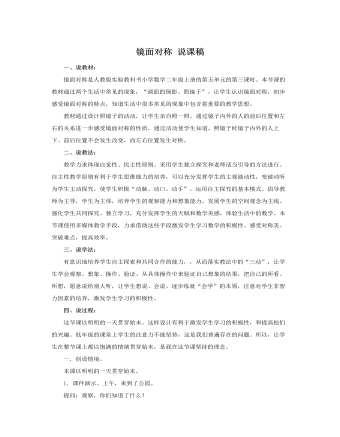
人教版新课标小学数学二年级上册镜面对称 说课稿
(1)让学生先想象以后,再发言。(2)组织两个学生亲自在全班进行验证。(3)组织学生汇报交流。通过学生的想象、验证,不但又一次让学生直观感受了镜面对称的性质,而且有利于学生的想象力和空间观念的培养。二.实践应用。1.进入第四个情境。配音:“咦,这是什么呢?”学生会很快答:是只蝴蝶。提问:怎样做才能看见一只完整的蝴蝶呢?学生回答后,课件演示一遍。要求以组为单位,拿出准备好的图片,进行照一照,能知道它们分别是些什么。指名学生上台演示。2.进入第五个情境。配音:“哪个是她们是在镜子里看到的样子呢?”指名选择,并说出为什么?3.玩游戏,比一比谁的反应快。游戏要求:老师做动作,要求学生做镜子里的动作。看谁反应快,谁能坚持到最后,谁就是胜利者。通过想一想、照一照、连一连、圈一圈等活动。加深了学生对镜面对称的性质的理解,使学生亲身体验了数学与日常生活之间的密切关系,培养了学生的空间想像力。
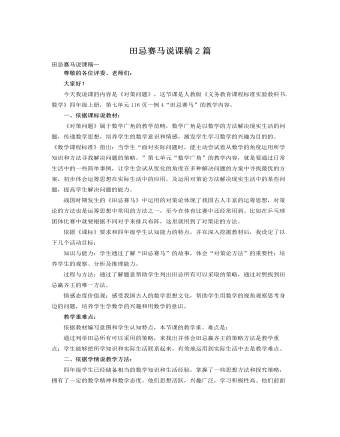
人教版新课标小学数学四年级上册田忌赛马说课稿2篇
(四)深入探究,重新审视对策问题解决问题不是学习的最终目的,让学生不断体验对策的价值才是关键所在。对策的价值在哪里?设计对策的关键是什么?把问题抛给学生去思考,一方面让学生再次感受正确对策达到“以小打大”、“以弱胜强”妙处,更重要的是让学生明确设计对策的关键前提是什么?即“知己知彼,百战不殆”的数学思想,以便根据对手的变化灵活运用对策。教学步骤设计:1、学生探讨,如果齐王的下等马都比田忌的上等马快,田忌还有获胜的可能吗?2、田忌赛马第二次获胜的前提是什么?(田忌猜测道齐王安排赛马的出场顺序还和第一次一样)3、如果齐王安排赛马的出场顺序改变了,田忌该怎样才能获得胜利?(找两位同学分角色演示一下)4、回忆课前时候,老师为什么会在纸牌游戏“比大小中”屡战屡胜。
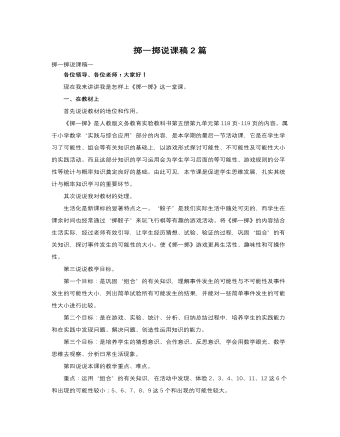
人教版新课标小学数学三年级上册掷一掷说课稿2篇
(1)猜想设疑。组织学生进行游戏实践,结果可能是选择和少的那队赢了。为什么选择和多的那队没胜,选择和少的那队却胜了呢?这里面又藏着什么奥秘呢?“猜想”是有方向的猜测和判断,是学生有效学习的良好准备。这里通过引导学生大胆猜测,由猜测结果与实际结果不同而引发学生的认知冲突,进而激发学生的求知欲,为后面的教学埋下了伏笔,从而很自然的过渡到下一个环节。(2)统计实验。这部分教学让全体学生参与获得知识的全过程,并在实验中与统计知识有机结合起来,提高了学生综合运用知识的能力。同时让全体学生参与实验统计,实验数据更加充分,实验结果与预测更加接近,从而达到实验目的。
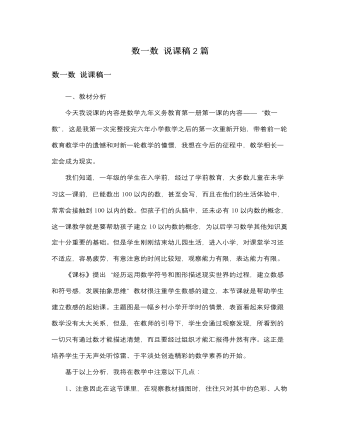
人教版新课标小学数学一年级上册数一数 说课稿2篇
为了进一步让学生掌握数数的规律,我把孩子们刚才数过的一些事物按照从小到大的顺序排列(多媒体课件),并要求学生再数一数,数完后再让他们读一读。这个环节的设计自始至终都让孩子自己去观察、动脑,主动参与到和他人的合作交流之中,在找、数和说的过程中探究新知,学会“一个一个地按顺序数数”。第三个环节:综合实践、学以致用。为了体现数学来于生活,用于生活的理念。首先,我出示了一些生活中孩子感兴趣的事物,要求孩子们正确地数出,并用数字来正确表述。此环节中,课件中所出示的图片与相应的数字一一对应,我让孩子们依次输出后,再指名同学用鼠标拖进正确的数字,孩子们觉得又新奇又好玩,纷纷要求上来试试,参与积极性非常之高。这是一个寓教于乐的环节,此环节中即让学生利用了和巩固新课中总结的新知识,又让学生在跃跃欲试的热情中感受到玩中学的乐趣。
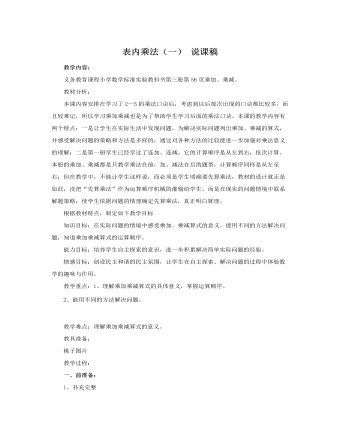
人教版新课标小学数学二年级上册表内乘法(一) 说课稿
本课内容安排在学习了2—5的乘法口诀后,考虑到以后每次出现的口诀都比较多,而且较难记,所以学习乘加乘减也是为了帮助学生学习后面的乘法口诀。本课的教学内容有两个特点:一是让学生在实际生活中发现问题,为解决实际问题列出乘加、乘减的算式,并感受解决问题的策略和方法是多样的,通过对各种方法的比较能进一步加强对乘法意义的理解;二是第一册学生已经学过了连加、连减,它的计算顺序是从左到右,依次计算。本册的乘加、乘减都是只教学乘法在前,加、减法在后的题型,计算顺序同样是从左至右;但在教学中,不能让学生这样说,而必须是学生明确要先算乘法,教材的设计就正是如此,没把“先算乘法”作为运算顺序机械的灌输给学生,而是在现实的问题情境中联系解题策略,使学生依据问题的情理确定先算乘法,真正明白算理。根据教材特点,制定如下教学目标知识目标:在实际问题的情境中感受乘加、乘减算式的意义,能用不同的方法解决问题,知道乘加乘减算式的运算顺序。
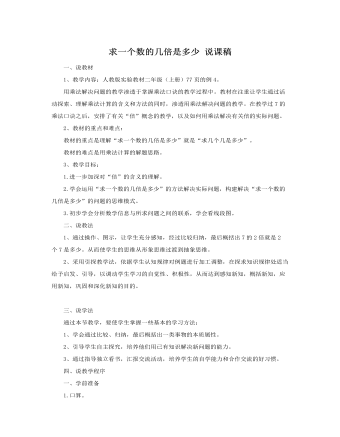
人教版新课标小学数学二年级上册求一个数的几倍是多少 说课稿
1、教学内容:人教版实验教材二年级(上册)77页的例4。用乘法解决问题的教学渗透于掌握乘法口诀的教学过程中。教材在注重让学生通过活动探索、理解乘法计算的含义和方法的同时,渗透用乘法解决问题的教学。在教学过7的乘法口诀之后,安排了有关“倍”概念的教学,以及如何用乘法解决有关倍的实际问题。2、教材的重点和难点:教材的重点是理解“求一个数的几倍是多少”就是“求几个几是多少”。教材的难点是用乘法计算的解题思路。3、教学目标:1.进一步加深对“倍”的含义的理解。2.学会运用“求一个数的几倍是多少”的方法解决实际问题,构建解决“求一个数的几倍是多少”的问题的思维模式。3.初步学会分析数学信息与所求问题之间的联系,学会看线段图。
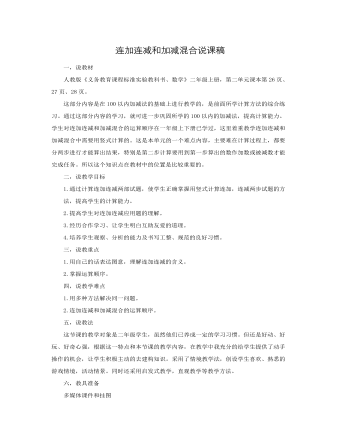
人教版新课标小学数学二年级上册连加连减和加减混合说课稿
(二)情境导入师:同学们你们喜欢去公园玩吗?(喜欢)那老师就带你们乘公交车去玩吧!出示:课本28页挂图,引导学生进一步进行认真观察,根据图意,编出应用题:车上有67人,到某一站后下车25人,上车28人,现在车上还有多少人?引导学生列出算式:67-25+28=【从学生熟悉的生活情形出发,选择学生常见的乘车情况,创设了一个问题情境,让学生凭着日常生活中的经验,通过看一看,说一说情境展现的内容活动,激发学生学习的兴趣,并提到相关的数学问题】1、读题,让学生说一说这道题与刚才所做的复习题有什么不同?学生可能会说:复习题是连加,连减,这道题是有加有减。教师可向学生进一步说明,这节课我们就来学习像这样的加减混合运算。师板书课题,加减混合。2、通过对连加连减的学习,你能用学过的知识做出这道题吗?
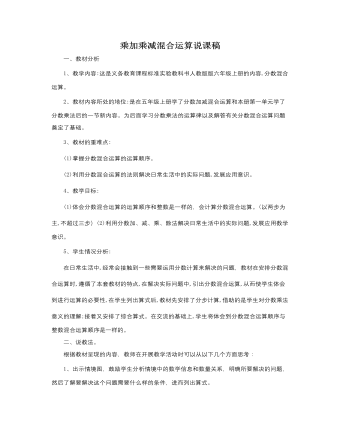
人教版新课标小学数学六年级上册乘加乘减混合运算说课稿
通过本节教学使学生学会运用直观的教学手段理解掌握新知识,学会有顺序的观察题、认真审题、正确计算、概括总结检查的学习习惯。四、教学程序一、复习1、说说每道题的运算顺序。2、问:在没有括号的算式里,如果有乘法又有加、减法,按怎样的顺序运算?在有括号的算式里,要按怎样的顺序运算?二、教学新课1、教学例2的第(1)题:说说这道题要先算哪一步再算哪一步?为什么要按照怎样的顺序运算?学生板演。2、教学例2的第(2)题。(1)说明:同样的,整数乘法的交换律、结合律对于分数乘法同样适用。(2)出示例2题(2):说说这道题例的数据有什么特点?这样算简便吗?为什么这样可以简便?应用了什么运算定律?按简便算法计算结果。3、练一练想先那些题可以用简便算法?指名板演。4、练习五2(做书上。第三题为什么可以用简便算法。)5、练习五后两题为什么这样算?三、巩固练习练习五1、3、5
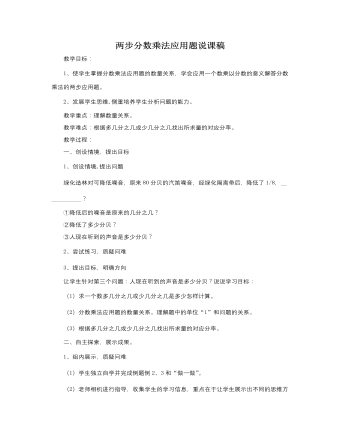
人教版新课标小学数学六年级上册两步分数乘法应用题说课稿
(三)看书质疑师:今天探索的问题与教科书第20-21页里例2-例3的内容相似,打开看看,书是怎么解答的?有疑问的可以提出来。生认真看书。生质疑。三、模拟练习,拓展应用师:请看学校调查表(课件出示),还有什么问题没有解决啊?(买折叠车和同学去秋游的人数)想解决吗?(想)师:提供这个信息能解决什么问题呢?生:买车的人数。师:你会直接口算吗?会的请你站起来告诉大家。生都站了起来了。师:这么都同学会啊,老师很为你们高兴,还是请代表说。生说。师:你们有意见吗?生:没有(好)师:谁能求出选择秋游的人数?生:不能啊,条件不充分师:那你能根据图意估计一下,然后补充一个条件,使我们能用今天的知识算出这些人数吗?

